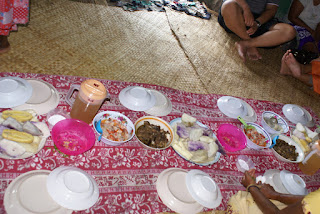

It is all over, after two intensive weeks the CTA course on the Production of Agricultural Extension Materials has ended. The certificates displayed tell part of the story. From the responses to the final course evaluation questionnaire by the participants, it is obvious that a lot had been gained especially in terms of the attitude to the production of extension materials. For all the participants, the end of the course signifies the beginning of the challenge - the challenge to make a positive difference to the state of agricultural information in the region.
The CTA approach adopts a participatory philosophy, recognising that farmers have a crucial role to play in identifying the specific agricultural information materials that they need. In general industry terms, this is a marketing approach as opposed to the sales approach where information materials are produced without consultatation with target clients by the agricultural ministries and supplied to the farmers who may or may not find the materials pertinent to their needs. When farmers do not find materials relevant to their information needs, they find other uses (eg. wrapping food) for the materials, discard them or simply ignore them.
Participants on the course particularly appreciated the consultation process with the farmers - the initial introduction by the local extension agents, the PRA discussions on their needs and priorities and the insightful critiquing of the draft products by the farmers at the testing and validation stage.
Some participants had suggested having more practice with computers but the fact is that this was not a computer course, the essential thing is to understand that a team with various skills is needed to produce the final material but the two most critical issues are to identify the real materials needed and then to develop the appropriate content. All other activities support these two issues. Back in the home stations, participants must identify the relevant team members so that their action plans can be achieved.
At the closing ceremony, participants presented their institutional action plans. All plans highlighted the strong need to produce agricultural extensional materials on return and participants feel sufficiently confident to take on the task. SPC will coordinate the action plans so that we can act as a group to see what new extension materials will be produced directly as result of this course.
Here are some of the general comments by participants.












































